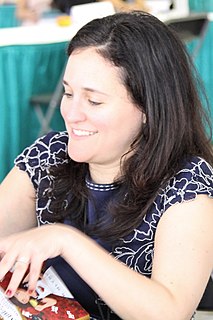A Quote by Sarah Mlynowski
I'm up at 8:30 every morning, and I write from about 9:00 A.M. to 7:00 P.M. - with some breaks, of course. I really try to see writing as a career that I turn off when my husband comes home from work. Otherwise, writing could very easily become all-consuming.
Related Quotes
One of the things that I love about being a writer is this. I wake up every day and I write for three hours. I wake up early. So like 6:00, 7:00 in the morning, I write till 9:00 or 10:00. I live in New York, nobody even is breathing until 9:00 or 10:00 in the morning. So, it's like my writing life is completely removed from the rest of my life.
A typical workday for me is getting up at about 5:00, 5:15 in the morning, getting some coffee or tea as quickly as possible, and then getting to my desk. And ideally, I'll start writing around 5:30, 5:45, and I'll write for three, four hours, and then I'll take a break, and read over what I write. Maybe about lunchtime, I'll go exercise or get out into the day. Then I'll either read over what I wrote the day before and quit work around 3:00 or 4:00 in the afternoon and spend some time with my kids.
My first workout starts at 9:00 a.m. every morning. I'm in the gym from 9:00 a.m. to 11:00 a.m. We do strength conditioning, stretching, pretty intense workouts in the morning. We go back in the gym at 1:00 p.m. and train until 5:00 p.m. It's all routines, repetition, doing the same skills over and over again, trying to polish and perfect everything. I head home, eat dinner, spend some time with my wife and start over the next day. I train about six days per week.
I tell a person, "If I could go home with you tomorrow and you and I could spend the day together from maybe 8:00 to 6:00, and we went out to a restaurant at 6:30, I could tell you with a high degree of accuracy how successful you're going to be." That's huge because I'm just going to look and see, what kind of attitude do you have, how do you relate to people, how well do you prioritize your life? I'm going to see all of those things in the process of a day.
You can’t miss your schedule. Every morning, you’re supposed to stick your right arm in this contraption in the wall. It tattoos the smooth inside of your forearm with your schedule for the day in a sickly purple ink. 7:00—Breakfast. 7:30—Kitchen Duties. 8:30—Education Center, Room 17. And so on. The ink is indelible until 22:00—Bathing
We're not really sure why it [broken circadian rhythm] continues, but when they become adults, we usually have to treat it because many people need to get up early to go to work and they can't be sleeping until 11:00 or 12:00. So we use treatments like bright light therapy, melatonin, things like that that are very effective.




































